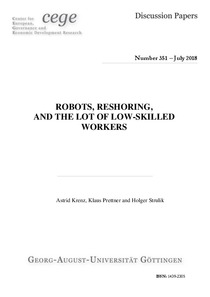Robots, reshoring, and the lot of low-skilled workers
"We propose a theoretical framework to analyze the offshoring and reshoring decisions of firms in the age of automation. Our theory suggests that increasing productivity in automation leads to a relocation of previously offshored production back to the home economy but without improving low-ski...
| Main Authors: | , , |
|---|---|
| Institution: | ETUI-European Trade Union Institute |
| Format: | TEXT |
| Language: | English |
| Published: |
Georg-August-Universität Göttingen
2018
|
| Subjects: | |
| Online Access: | https://www.labourline.org/KENTIKA-19301221124911294039-Robots,-reshoring,-and-the-lot.htm |
| Summary: | "We propose a theoretical framework to analyze the offshoring and reshoring decisions of firms in the age of automation. Our theory suggests that increasing productivity in automation leads to a relocation of previously offshored production back to the home economy but without improving low-skilled wages and without creating jobs for low-skilled workers. Since it leads also to increasing wages for high-skilled workers, automation induced reshoring is associated with an increasing skill premium and increasing inequality. Using a new measure of reshoring activity and data from the world input outputtable, we find evidence for a positive association between reshoring and the degree of automation. On average, within manufacturing sectors, an increase by one robot per 1000 workers is associated with a 3.5% increase of reshoring activity. We also provide evidence that reshoring is positively associated with wages and employment for high-skilled labor but not for low-skilled labor." |
|---|---|
| Physical Description: | 32 p. Digital |

